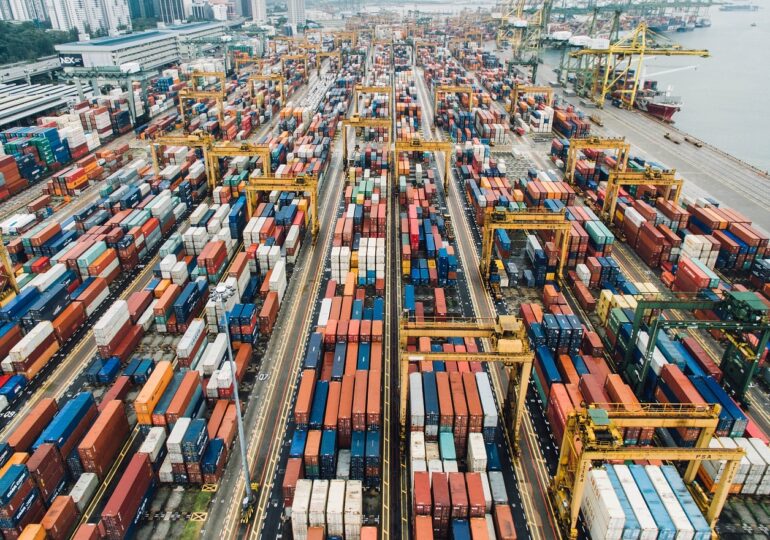German exports of cars to Kyrgyzstan have increased by 5,100% since the beginning of the Ukraine war. There are other ways in which Russia obtains technology and luxury products, despite Western sanctions imposed on it.
Since Vladimir Putin’s invasion, the West has imposed dozens of restrictions on Russia, making it the most sanctioned country on the planet. Targeting almost „anything that moves,” from the finances of important figures to key sectors of the economy, the sanctions aimed to isolate Russian consumers, leading major brands like Apple and McDonald’s to close operations in the country.
Yet, after two years, Russia's economy shows surprising resilience, and forecasts indicate it will surpass the growth of advanced economies, although experts say this trend is not sustainable in the long term.
The United States announced on Tuesday that at the G7 summit in Italy this week, they will introduce a series of new "impactful" sanctions and export controls. The U.S. Treasury will target financial institutions linked to imports for Russia's war effort, meaning banks in countries not subject to sanctions that facilitate the supply of goods and services to Russia will be scrutinized.
Russia's economy has been partially supported by such imports, as reported by The Guardian.
Abnormal imports of German cars in Kyrgyzstan
Internal data from the Russian customs agency shows that imports are returning close to pre-war levels, analysts say, although at considerably higher prices. These imports have helped sustain vulnerable industries such as aviation and the automotive industry.
Anything from semiconductors to airplane parts to iPhones can be redirected and exported to Russia through third-party countries like China, Turkey, or the United Arab Emirates, or through Armenia, Kazakhstan, and other former Soviet republics.
These clandestine imports include valuable goods, such as microchips necessary for Russia's war effort (including chips made by American manufacturers like Xilinx and Texas Instruments) or Intel processors.
Technology is often purchased by companies in Hong Kong or China and re-exported to Russia, according to data cited by the British newspaper.
"Russia's invasion of Ukraine has shown that there is a governance crisis in the EU. The EU has become a war agent," said Robin Brooks, a member of the Brookings Institution, in a debate on circumventing Western sanctions.
Brooks, who analyzed the effectiveness of export controls, cited the example of German car exports to Kyrgyzstan, which have increased by 5,100% since the start of the war. "Not because people in Bishkek (the capital of Kyrgyzstan) have decided they like Mercedes. These are cars that end up in Russia. Such things don't even reach Kyrgyzstan. Kyrgyzstan only appears on the invoice," the expert explained.
Export data shows that this trend is repeated in every European country. "This has offset about half of the decline in direct exports to Russia," Brooks added.
Analyses have shown that the Russian military has exploited these loopholes to acquire critical Western military technology. According to a report by the Royal United Services Institute (RUSI), over 450 foreign-manufactured components have been identified in Russian weapons found in Ukraine.
The U.S. and the EU have recently intensified efforts against companies and banks in intermediary countries that transact with Russia, but some countries vital to Russia's efforts to circumvent sanctions resist Western pressure.
In a recent interview with the Financial Times, Hamad Buamim, president of the Dubai Multi Commodities Centre, the main trading hub of the oil-rich state, stated that sanctions against Russia have had no impact outside the West, and attempts to stop business flows have only redirected them elsewhere.
"The fact that the economy is not solely controlled by one part of the world makes these sanctions less effective. Trade continues to flow, it just flows differently," Buamim said.
"Dark Fleet" transporting Russian oil
Continued imports into Russia and support for its economy would be impossible without the substantial revenues generated from its energy resources - and here Moscow has relied on external actors willing to defy Western sanctions.
In December 2022, the United Kingdom, along with the G7 countries, Australia, and the European Union, imposed a price cap of $60 per barrel of oil to prevent Western companies from transporting or brokering Russian oil to undermine Russia's oil trade, which largely relies on tankers owned and insured by the West.
What happened next? To transport oil abroad and acquire much-needed foreign currency, Russia turned to a "dark fleet" of older tankers with unclear ownership.
Greek shipping magnates, who play a huge role in global oil trade, intervened and sold hundreds of old ships to Russia in a phenomenon known as the "Great Greek Tanker Sale."
According to the trade publication TradeWinds, Greek shipowners have sold at least 125 oil tankers and vessels worth over four billion dollars to strengthen Russia's "dark fleet."
What can be done to curb Russia's hidden imports
Now, G7 leaders meeting in Italy largely agree that the impact of sanctions imposed on Russia has been slower than expected.
"So far, we have failed in our main objective, which is to remove Russia from Ukraine," Brooks said.
According to him, the key to hitting Moscow remains targeting its energy profits. Measures proposed by Brooks and other sanctions experts include reducing the oil cap to $20 per barrel and banning the sale of Western tankers to unidentified buyers.
"If Europe is willing to take decisive action, we will see a financial crisis in Russia," Brooks said.
T.D.

